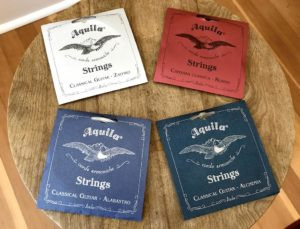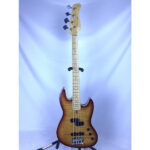Choosing the right set of strings is crucial for any classical guitar player. With so many options available, it can be overwhelming to find the perfect match for your instrument and playing style. If you’re looking for a warm, smooth, and forgiving sound, nylon guitar strings are an excellent choice. This guide will help you navigate the world of nylon strings and discover the best options to enhance your classical guitar playing experience.
Why Choose Nylon Guitar Strings?
Nylon strings have been the standard for classical guitars for decades, and for good reason. They offer a unique tonal quality that is distinct from steel or other synthetic strings. Generally, nylon strings are known for their:
- Warmth: They produce a mellow, rounded tone that is often described as warm and inviting. This makes them ideal for classical music, flamenco, and fingerstyle genres.
- Smoothness: Nylon strings are gentle on the fingertips, making them comfortable to play, especially for beginners or players with sensitive fingers.
- Forgiveness: They tend to be more forgiving of slight imperfections in technique, producing a pleasant sound even if your finger placement isn’t perfectly precise.
- Full Body Sound: Nylon strings contribute to a full-bodied sound with rich harmonics, adding depth and character to your guitar’s voice.
However, it’s also important to acknowledge some potential drawbacks of nylon strings compared to other types:
- Less Clarity: Compared to carbon strings, nylon strings can sometimes sound less clear or articulate, especially in higher registers.
- Potential for Muddiness: In certain guitars or playing situations, nylon strings might sound muddy or lack definition, particularly in the bass frequencies.
- Intonation Challenges: Some players find that nylon strings can have slightly less precise intonation compared to carbon strings, especially in higher tensions.
Despite these points, the warmth and playability of nylon strings make them a favorite among classical guitarists worldwide.
Key Considerations When Selecting Nylon Guitar Strings
To find the best nylon strings for your guitar, consider these key factors:
-
Tension: String tension refers to the tightness of the strings when tuned to pitch. Nylon strings are typically available in different tension levels:
- Normal/Regular Tension: A good starting point for most players. Offers a balanced feel and tone.
- Hard Tension: Provides more projection, clarity, and a slightly stiffer feel. Can be beneficial for players with a stronger attack or guitars that are naturally warmer.
- Low Tension: Softer feel, easier to play, and produces a warmer, more mellow tone. Suitable for players with a lighter touch or vintage guitars.
- Extra-Hard Tension: Offers maximum projection and volume, but can be harder on the fingers and may not be suitable for all guitars.
-
Materials and Construction: While generally referred to as “nylon,” different materials and construction methods can influence the string’s tone and feel. Some common variations include:
- Clear Nylon: The most traditional type, offering a classic warm and balanced tone.
- Rectified Nylon: Nylon that has been ground to a precise diameter, resulting in improved intonation and consistency.
- Composite Nylon: Blends of different nylon polymers or materials, aiming to enhance specific tonal qualities like clarity or projection.
-
Tone and Sound Quality: Consider the tonal characteristics you desire:
- Warmth vs. Brightness: Do you prefer a warmer, mellow tone or a brighter, more projecting sound? Nylon strings generally lean towards warmth, but variations exist.
- Balance: A balanced set of strings will have consistent volume and tone across all six strings.
- Sustain: The duration of a note after it’s played. Nylon strings typically have good sustain, contributing to a resonant sound.
-
Brand and Personal Preference: Many reputable brands specialize in classical guitar strings, each with its own unique formulas and manufacturing processes. Experimenting with different brands is key to finding what works best for you.
Recommended Nylon Guitar String Brands and Sets
Here are some popular nylon string brands and sets, offering a range of options to explore:
D’Addario Pro Arte

- Description: D’Addario Pro Arte strings are a widely recommended and affordable option, especially for students and players seeking a reliable, traditional sound. They are known for their warm, forgiving tone and consistent quality. Available in normal, hard, and extra-hard tensions.
- Recommended for: Beginners, students, players seeking a balanced and warm tone, general practice and performance.
- Tension Recommendation: Hard tension is often recommended for students seeking a bit more projection, but normal tension is also a great starting point.
Augustine Imperial Red
- Description: Augustine Imperial Red strings are a step up in quality from basic strings, offering a warmer and nicely balanced tone. They are a great all-around string set suitable for traditional classical guitar repertoire. Known for their warm and forgiving nature, but with slightly more clarity than some other nylon strings.
- Recommended for: Intermediate players, those seeking a refined warm tone with good balance, traditional classical music.
- Tension Recommendation: Typically available in standard tension, providing a comfortable and responsive feel.
Aquila Cristallo
- Description: Aquila Cristallo strings are known for their round, mellow nylon tone. They offer a medium-bodied sound that is pleasant and forgiving. While still nylon strings, they provide a bit more clarity compared to some traditional nylon sets, while maintaining a warm character. Hard tension available.
- Recommended for: Players seeking a mellow and forgiving nylon string with a touch more clarity, warm and intimate playing settings.
- Tension Recommendation: Hard tension is available and often preferred for enhanced projection while retaining the Cristallo’s characteristic warmth.
La Bella 2001 Classical Guitar Strings
- Description: La Bella 2001 strings are a premium nylon string option, known for their warm and full sound. They have a slightly thicker gauge than some other nylon strings, contributing to their rich tone. Compared to D’Addario nylons, they offer a fuller sound, and are similar to Savarez New Cristals but perhaps with a bit more fullness and less edge. Basses are full and well-balanced with the trebles.
- Recommended for: Players seeking a high-quality nylon string with a rich, full, and warm tone, solo performances, recording.
- Tension Recommendation: Typically available in medium tension, offering a comfortable balance of playability and tone.
Savarez Corum Alliance
- Description: Savarez Corum Alliance strings are a popular choice for players needing more clarity and projection from nylon strings. They are brighter and stiffer than traditional nylons, offering improved intonation and projection. Ideal for ensemble playing, larger venues, or guitars that tend to sound overly warm or dull. However, their stiffness might not be ideal for players with hand issues, and the high E string can be quite bright.
- Recommended for: Ensemble playing, large halls, guitars that need brightening, players seeking maximum clarity and projection from nylon strings.
- Tension Recommendation: Available in various tensions, consider normal or hard tension depending on your guitar and playing style.
Nylon vs. Other String Types for Classical Guitar
While this guide focuses on nylon strings, it’s helpful to briefly compare them to other options:
- Carbon Strings: Known for their brightness, clarity, and projection. Excellent for cutting through in ensembles or filling large spaces. Can be less forgiving than nylon and potentially harsh if not paired with the right guitar or playing technique.
- Composite Strings: Strings made from blends of materials like titanium and other synthetics. Aim to bridge the gap between nylon and carbon, offering a balance of warmth and clarity. Results can vary, and they haven’t gained the same widespread popularity as nylon or carbon.
- Combo Sets: Some manufacturers offer sets that combine different string types, such as using a carbon G string with nylon trebles and basses, to achieve a balanced tone.
Conclusion: Experiment to Find Your Best Nylon Strings
The “best” nylon guitar strings are ultimately subjective and depend on your individual guitar, playing style, and tonal preferences. This guide provides a starting point for exploring the world of nylon strings. Experiment with different brands, tensions, and materials to discover the set that unlocks the full potential of your classical guitar and inspires your musical journey. Don’t hesitate to try sets from D’Addario, Augustine, Aquila, La Bella, and Savarez to find your perfect match.

